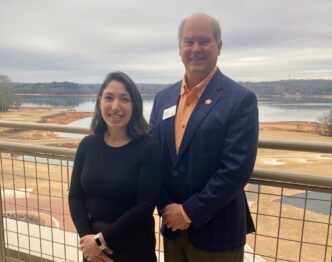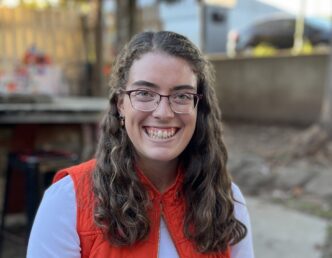Clemson University’s Department of Historic Properties is helping teachers bring history to life in the first-ever Professional Advancement Through History (PATH) Summer Teacher Institute. The institute was funded by a $10,000 grant from the South Carolina Humanities Council.
Thirteen teachers from across South Carolina attended the institute in July on the Clemson campus for workshops on a variety of topics, such as place-based learning, integrating local history into their curricula, and creating lesson plans and teaching materials. The institute included field trips to Fort Hill National Landmark, Hanover House, Hopewell, and Special Collections and Archives.
The institute was coordinated by Kristen Fink, a doctoral candidate in Teaching and Learning, and several faculty from the College of Education helped with the professional development sessions.
“The purpose of the institute is to support South Carolina teachers in developing their ability to plan and implement high-quality field trips to sites that will enable their students to interact with the history of their state,” said Fink. “If you look at the South Carolina state social studies standards, every major historical time period is connected to the history of our historic houses. By holding this institute on Clemson’s campus, we’re using our houses, and specifically this year Hanover House, as a primary source to help attending teachers learn state history and apply it with their students.”

Katie Dodd, social studies teacher at Seneca High School, was one of the teachers who attended the institute.
“If you had asked me two months ago why I chose to apply to the PATH Institute, I probably would have told you it was because I was interested in local history and wanted a professional development opportunity that was close to home. But in reality, this institute was so much more than that,” said Dodd. “I am so thankful that I attended this institute, as I walked away with so much more than just information about field trips I could take my students on locally. Personally, I walked away with improvements to my own practice through an increased knowledge about our local history and resources available to me in my classroom. However, I also enjoyed being able to work with other educators and encourage each other as we strive to improve our practices and opportunities for our students. This Institute gave me several new tools and opportunities for this upcoming school year, and I look forward to collaborating with Clemson’s Department of Historic Properties in the future.”
Some Clemson students also participated in the institute, including Jackie Forbes, a graduate student in the Teacher Residency Program in the College of Education. Forbes also works as a student guide at Fort Hill.
“PATH allowed me to interact with and learn from teachers from all different expertise and skill sets. I particularly enjoyed getting to workshop field trip ideas with these veteran educators, as it gave me great insight into how seasoned teachers think and plan,” Forbes said. “It was wonderful to get to talk to other, newer teachers, as well. I was able to talk to a first-year teacher whom I felt a sense of comradery with; this made me feel less alone going into my year-long student teaching. For me, PATH was largely a learning experience and an opportunity to talk with more experienced educators.”







